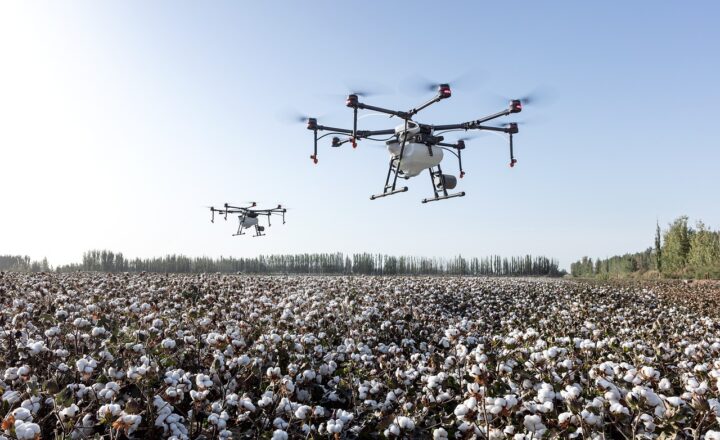How AI is Used in Agriculture: Precision Farming, Crop Monitoring, and Sustainable Practices
November 10, 2024

The agriculture industry has witnessed a significant transformation over the past few years, largely due to the advancements in technology. One of the most profound ways technology has been integrated into agriculture is through artificial intelligence (AI). AI is revolutionizing farming practices, improving efficiency, and driving us towards more sustainable agricultural practices. In this detailed exploration, we will delve into how AI is utilized in agriculture, focusing on precision farming, crop monitoring, and sustainable practices.
1. Understanding Artificial Intelligence in Agriculture
Artificial Intelligence (AI) refers to the simulation of human intelligence in machines that are designed to think and perform tasks like humans. In agriculture, AI employs data analytics, machine learning, and automation technologies to enhance farming processes and yield better productivity. AI can analyze vast amounts of data from various sources, providing farmers with actionable insights to make informed decisions.
Key components of AI in agriculture include:
- Data Collection: Data from various sources like weather reports, satellite images, and soil health are integrated for analysis.
- Machine Learning Models: Algorithms that learn from data patterns help predict outcomes and optimize farming practices.
- Automation and Robotics: Autonomous machines and robots for seeding, monitoring, and harvesting crops efficiently.
Through these components, AI helps conversion data into meaningful information, assisting farmers in making proactive choices.
2. Precision Farming: The Future of Agriculture
Precision farming, also known as precision agriculture, involves applying AI to optimize field-level management regarding crop farming. This method promotes efficiency in both resource usage and yield, thereby leading to increased production at lower costs.
Here are some ways AI is enhancing precision farming:
- Soil Health Monitoring: AI-driven sensors collect real-time soil data, enabling farmers to make informed decisions on soil management. This results in optimized irrigation, fertilization, and pesticide application.
- Yield Prediction: Machine learning models analyze historical data and real-time variables such as weather and soil conditions to predict crop yields accurately. This assists farmers in planning resources and investments effectively.
- Seed and Fertilizer Optimization: By leveraging AI algorithms, farmers can determine the optimal type and amount of seeds and fertilizers required for specific crops to maximize productivity while minimizing waste.
With these intelligence-driven practices, farmers can boost their productivity substantially while efficiently managing resources.
3. Crop Monitoring and Disease Detection
Crop health monitoring is one of the significant areas where AI technology has made a notable impact. With the use of advanced sensors, drones, and satellite imagery, farmers can monitor the health of their crops effectively. The advantages include:
- Drones and Satellite Imagery: Aerial imagery from drones equipped with multispectral cameras helps in assessing crop conditions, identifying areas needing attention, and analyzing plant health. AI tools can process this visual data, classifying it to determine whether crops are healthy or affected by diseases.
- Automated Disease Detection: AI-powered systems can analyze images of crops in real-time to look for signs of disease or pest damage. This allows for timely intervention and minimizes crop loss while reducing the need for chemical pesticides.
- Smart Irrigation Systems: AI also plays a vital role in irrigation management. Systems can assess moisture levels and forecast weather conditions to optimize irrigation schedules and water usage, ensuring crops receive adequate hydration without overuse of resources.
These advancements empower farmers with the ability to make data-driven decisions, ultimately maximizing crop output and minimizing losses.
4. Sustainable Agricultural Practices through AI
Sustainability in agriculture means meeting current food needs without compromising the ability of future generations to meet their needs. AI contributes significantly to sustainable practices in agriculture:
- Efficient Resource Management: AI optimizes the use of water, fertilizers, and pesticides, reducing wastage and minimizing the environmental footprint of farming activities.
- Reduction of Emissions: By optimizing the use of chemicals and energy, AI-driven farms can reduce greenhouse gas emissions and enhance their sustainability profile.
- Biodiversity Maintenance: AI can assist in planning crop rotations and intercropping strategies that maintain soil health and promote biodiversity, creating a balanced ecosystem vital for sustainable agriculture.
By integrating AI into agricultural practices, farmers can contribute to a more sustainable future while maintaining profitability.
5. Challenges and Considerations in Implementing AI in Agriculture
While the benefits of integrating AI into agriculture are significant, there are challenges that farmers must navigate:
- High Initial Investment: Introducing AI technologies often requires substantial upfront capital, creating a barrier for small farmers.
- Training and Knowledge Gap: Farmers need to be adequately trained to adopt and operate AI technologies effectively. Education and support programs are essential for successful implementation.
- Data Privacy and Security Concerns: As farming practices become more data-centric, concerns over data ownership and privacy must be addressed, ensuring that farmers can trust the technologies they employ.
By recognizing these challenges and working collaboratively with technology providers, the agricultural industry can leverage the power of AI to achieve its potential.
6. Conclusion: The Future of AI in Agriculture
The integration of artificial intelligence in agriculture signifies a new era characterized by efficiency, productivity, and sustainability. As farmers continue to embrace these technologies, AI will undoubtedly play a central role in addressing the challenges of feeding a growing global population while conserving natural resources. Whether it’s through precision farming techniques, advanced crop monitoring systems, or sustainable management practices, AI is fundamentally changing the landscape of agriculture for the better.
In conclusion, as the agricultural sector adapts to new technologies, it stands to benefit significantly from the insights and efficiencies that AI brings. By investing in AI solutions, farmers will not only enhance productivity but also contribute to sustainable practices that promise to protect our planet for future generations.








